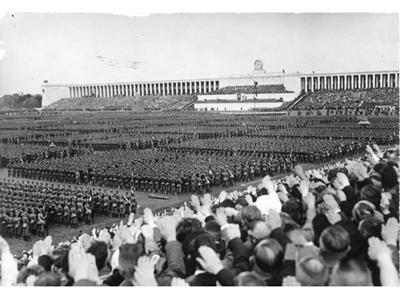Prof. Neil Gregor to Inform Conservation Work and Exhibition at Nazi Party Rally Grounds, Nuremberg
.jpg_SIA_JPG_fit_to_width_INLINE.jpg)
Neil Gregor, Professor of Modern European History at the University of Southampton, has been invited to join the newly formed Academic Advisory Committee of the Documentation Centre Nazi Party Rally Grounds at Nuremberg in Germany. This appointment is a major honour and means that Neil will have a significant role in shaping the museum displays and activities at one of Europe's most iconic and sensitive historical sites as they are rethought and renewed over the coming years. The current conservation work at the Zeppelin Field, one of the key archaeological components of the site, is the object of a 90 million Euro project.
Professor Neil Gregor is working with the Documentation Centre Nazi Party Rally Grounds, Nuremberg, which is a major museum/exhibition, established in 2001 by the City of Nuremberg. The site had nearly 300,000 visitors last year. It is one of the most important and well-known sites of modern history in Europe and, given its significance, one of the most sensitive and challenging sites in Germany to curate. The permanent exhibition in the Documentation Centre gives a comprehensive picture of the National Socialist dictatorship as well as the history of the Nazi Party rallies.
One of the major elements of the Nazi Party rally grounds, the Zeppelin Tribune (pictured) (Photo credit: Culture Office, City of Nuremberg) – part of Albert Speer's iconic rally ground architecture and the main stage from which Hitler addressed Nazi groups at his Nuremberg rallies – has become structurally unstable and is currently closed to visitors. Albert Speer was Hitler's favourite architect, and the principal figure behind the Nazi party rally grounds, along with many other iconic Nazi buildings.

Following years of debate over whether to preserve the site or let it crumble, the city of Nuremberg decided to conserve it. Recently a finance package of 90m euros was agreed between the Federal Government, the state government of Bavaria and the city of Nuremberg to enable that work.
Neil has been working on a consultancy basis for some time with colleagues at the Documentation Centre, the city culture authorities, and specialists in public history from Lucerne to develop broad proposals for this project. This has included taking part in closed workshops, public podium discussions, panel presentations in Brussels (with the Bavarian minister for Education and the mayor of Nuremberg).
A permanent 'Wissenschaftlicher Beirat' (academic advisory board) has now been formed to enhance work on the Documentation Centre. Neil is honoured to be invited to become a member of this board. He will be involved in creating plans for the presentation of the Zeppelin Tribune once it has reopened. He will also inform the overhaul of one of the world's major standing exhibitions on the history of the Third Reich, which is housed in the Documentation Centre.
Neil’s involvement with Nuremberg and its history goes back to the publication of his book Haunted City: Nuremberg and the Nazi Past (Yale UP, 2008), which won the Fraenkel Prize for Contemporary History and has become a standard work on the history of the city.